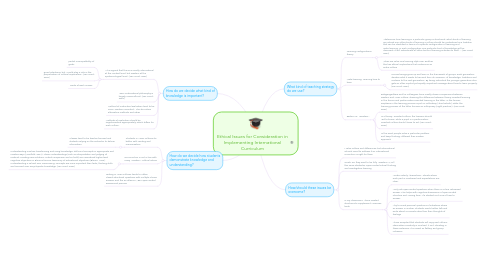
1. How do we decide what kind of knowledge is important?
1.1. "It is argued that the IB is overtly international at the content level, but western at the epistemological level" (van Oord, 2007)
1.1.1. partial incompatibility of goals
1.1.2. good intentions, but "could play a role in the perpetuation of cultural imperialism" (van Oord, 2007)
1.1.3. Goals of Each Lesson
1.2. "IBO's educational philosophy is largely monocultural" (van Oord, 2007)
1.3. Method of instruction/evaluation tend to be more "western-oriented". This de-values alternative methods and ideas
1.4. Methods of evaluation should be supplemented appropriately, which differs for each culture.
2. How do we decide how students demonstrate knowledge and understanding?
2.1. Students in Asian cultures do better with reciting and memorization.
2.1.1. Classes tend to be teacher-focused and students relying on the instructor to deliver information.
2.2. IB curriculum is not in line with many "eastern" cultural values
2.2.1. Understanding involves transforming and using knowledge, skills and concepts in appropriate and creative ways (Woolfolk, 2001). These understandings (such as interpretation and judging of material, creating new solutions, critical comparison and so forth) are considered higher-level cognitive objectives in Bloom’s famous taxonomy of educational objectives (Bloom, 1956). Understanding is valued over memorizing, concepts are more important than facts; thinking skills are favoured over encyclopedic knowledge. (van Oord, 2007)
2.3. Testing in Asian cultures tends to utilize closed-structured questions with multiple choice answers and the IB utilizes a VERY open ended assessment process
3. What kind of teaching strategy do we use?
3.1. Learning configurations theory
3.1.1. "determine how learning in a particular group is structured: which kinds of learning are valued over other kinds of learning a culture should be understood as a tradition that can be identified in terms of a specific configuration of learning and meta-learning. In each configuration one particular kind of knowledge will be dominant: it will subordinate all other kinds of learning activities to itself. " (van Oord, 2007)
3.1.2. When we value one learning style over another, this has ethical implications that undermine an entire culture
3.2. Meta-learning- Learning how to learn
3.2.1. Human beings grow up and learn in the framework of groups. Each generation decides what it wants to transmit from its ‘reservoir’ of knowledge, traditions and customs to the next generation. By being instructed the younger generation also gets an often implicit yet equally important message about how to learn properly. (van Oord, 2007)
3.3. Eastern vs. "western"
3.3.1. Balagangadhara and his colleagues have mostly drawn comparisons between western and Asian culture, stressing the difference between theory-oriented learning in the former and performative-oriented learning in the latter. In the former, emphasis in the learning process is put on orthodoxy (‘true beliefs’), while the learning process of the latter focuses on orthopraxy (‘right practice’). (van Oord, 2007)
3.3.2. In a theory- oriented culture, the learners should ‘act to know’, while a pupil in a performative- oriented culture should ‘know to act’ (van Oord, 2007)
3.3.3. In the west, people solve a particular problem and keep thinking, different than eastern approach
4. How/should these issues be overcome?
4.1. I value culture and differences, but international schools need to address if an international curriculum is right for them
4.2. Goals: Do they want to be fully "western"? Will this serve students? Open-ended critical thinking and investigative learning
4.3. In my classrooms, I have created structures to supplement American texts.
4.3.1. I make orderly "brainstorm" sheets where each part is numbered and expectations are clear.
4.3.2. I only ask open-ended questions when there is a clear rehearsed answer. This helps with cognitive dissonance of open-ended structure and "saving face" if a student isn't sure of how to answer.
4.3.3. I try to avoid personal questions of situations where an answer is unclear. Students would rather talk and write about a concrete idea than their thoughts of feelings
4.3.4. I have accepted that students will copy each other's ideas when creativity is involved. It isn't cheating in these instances, it is meant as flattery and group cohesion.
